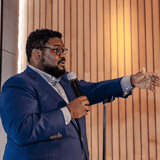Summary
Over the past 25 years, Steve Portigal has seen tremendous growth in user research as a community of practice, as an industry, and as a career. Steve will look at some of the changes that he’s experienced and observed—positive, negative, or otherwise. He’ll share some of the potentially overlooked opportunities to advance our field, issues that demand our limited attention and concern. He’ll also share his perspective on the directions we can drive towards.
Key Insights
-
•
User research has roots back to Edison’s in-home researchers analyzing fuel consumption.
-
•
Time and motion studies in the early 20th century treated people like machines but laid groundwork for usability concepts.
-
•
Louis Cheskin’s 1940s experiments revealed how packaging shapes consumer perception, not just products themselves.
-
•
Xerox PARC in 1969 was pivotal for user interface design, inspiring Apple’s GUI innovations.
-
•
Interval Research (1982), founded by Paul Allen, linked research to startup incubation but mostly influenced culturally.
-
•
Kate Tassie coined PWDR in 2018 to distinguish trained researchers from those who simply do research, adding clarity to role definitions.
-
•
Corporate research often aligns researcher incentives with company success, shifting researcher focus compared to consultants motivated solely by integrity.
-
•
Transcription technology now equals human error rates, but the imperfect 'good enough' acceptance risks degrading research quality.
-
•
The evolution of tools—from cultural probes and disposable cameras to AI-driven platforms—shapes how research is conducted, for better or worse.
-
•
Emerging future scenarios warn of AI replacing UI researchers, variable corporate control of user experiences, and potential for user research as a shared public good.
Notable Quotes
"Historians say the past doesn’t repeat itself, it rhymes."
"We all stand on the shoulders of giants."
"People in organizations are already, to some extent, out there talking to users."
"Research is complex because we use the term to mean anything and everything."
"The in-house researcher has some elements of the client and stakeholder roles."
"The curse of good enough is a real trap that we’re grappling with."
"Paper prototyping was the original scrappy; low fidelity tools produce different responses than high fidelity."
"Corporate capture of research has brought amazing good things but changed the truth to power role."
"Remote research is the default now, but we’ve lost access to rich in-person context."
"The future of user research is not one future but many futures to consider."
Or choose a question:















More Videos

"When you design for the edges, you make things better, more fluid, more customizable for everyone."
Sam ProulxOnline Shopping: Designing an Accessible Experience
June 7, 2023

"Career managers develop close relationships with designers and advocate for staffing and promotions on their behalf."
Ignacio MartinezFair and Effective Designer Evaluation
September 25, 2024

"Using program dollars to hire freelancers helped me avoid difficult conversations with HR and finance early on."
Sarah Kinkade Mariana Ortiz-ReyesDesign Management Models in the Face of Transformation
June 8, 2022

"Companies today are embracing these principles, seeing the value of user connection and self-actualization for business success."
Daniel GloydWarming the User Experience: Lessons from America's first and most radical human-centered designers
May 9, 2024

"AI systems can present speculative connections as established facts, so confidence ratings are critical."
Patrick BoehlerFishing for Real Needs: Reimagining Journalism Needs with AI
June 10, 2025

"How do you build in the context of what you specifically need rather than having tools drive the research process? That’s the future."
Andy Barraclough Betsy NelsonFrom Costly Complexity to Efficient Insights: Why UX Teams Are Switching To Voxpopme
September 23, 2024

"The future of our technology cannot and should not rest solely on the ethics of individual designers."
Alexandra SchmidtWhy Ethics Can't Save Tech
November 18, 2022

"In government, the motivation is reduction of misery: why are we up at 3 AM fixing something avoidable?"
Louis RosenfeldDiscussion: What Operations can teach DesignOps
November 6, 2017

"Discomfort and growth cannot coexist. You have to embrace discomfort to push innovation forward."
Mitchell BernsteinOrganizing Chaos: How IBM is Defining Design Systems with Sketch for an Ever-Changing AI Landscape
September 29, 2021
















